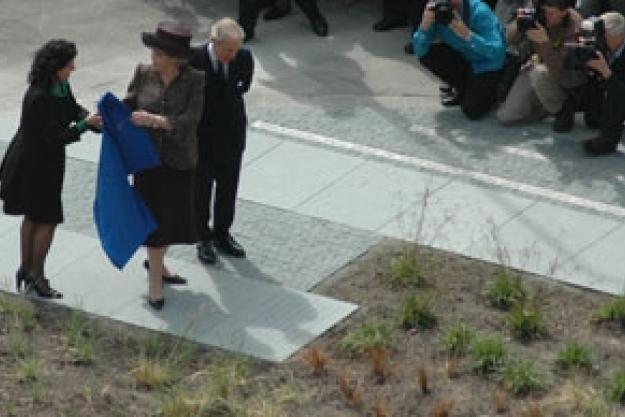
The solemn ceremony was attended by the Foreign Minister of the Netherlands, H.E. Maxime Verhagen, as well as representatives of the OPCW Member States, international organizations, parliamentary and government officials of the Netherlands, as well as representatives of chemical industry and civil society.
During the ceremony, Queen Beatrix unveiled the permanent Memorial dedicated to all Victims of Chemical Weapons. The Memorial symbolizes the ever-growing global will to eliminate chemical weapons and to establish a world free of chemical weapons.
The Memorial was made possible through a generous gift from the OPCW’s Host Country, the Netherlands, provided by the Ministry of Foreign Affairs of the Netherlands and the City of The Hague.
On behalf of the OPCW, the Chairperson of the Conference of the States Parties, H.E. Mr Alfonso M. Dastis, expressed to Her Majesty the great significance the Organisation places upon her presence at the OPCW. He recalled that the OPCW is hosted by the City of The Hague, in close proximity to several international organisations dedicated to securing peace and enhancing security. Noting that every organisation’s success depends upon the will of its Member States to achieve unanimity, Ambassador Dastis drew attention to the Member States’ diverse cultural and regional heritage and commended them for attaining and sustaining the collective resolve to never rest until the last chemical weapon has been destroyed.
In his address to the gathering, OPCW Director-General, H.E. Ambassador Rogelio Pfirter, paid tribute in grief and respect on this day of remembrance to the many people across the world victimised by chemical weapons. He pledged that their agony would not be forgotten and continues to fortify the OPCW Member States’ determination to fulfil the lofty goals of the Chemical Weapons Convention. Director-General Pfirter also saw ample reason for gratification, because the OPCW has made concrete progress in the past decade in its mission to eliminate chemical weapons, prevent their use and manufacture, provide assistance and protection against their use, as well as to foster international cooperation in the peaceful uses of chemistry.
Noting that through this ceremony, Member States are recommitting themselves without distinction of culture, race or creed to a future free of chemical weapons, Director-General Pfirter elaborated the challenges that had yet to be overcome to reach the Convention’s universal application. He concluded that the dedication of a living and permanent Memorial, symbolized by a maple tree that integrates distinctive technological elements, signifies the Organisation’s continuing and active engagement in attaining mankind’s ascent.
A number of international, regional and national organisations and institutions were represented at the solemn ceremony, including the United Nations, the International Criminal Court, the International Court of Justice, the International Criminal Tribunal for the Former Yugoslavia, the Red Cross, and the Comprehensive Test-Ban Treaty Organization.
The Personal Representative on non-proliferation of Weapons of Mass Destruction for the High Representative for the Common Foreign Security Policy of the Council of the European Union also attended the event. The European Chemistry Council, CEFIC, was represented at the event and accompanied by representatives of chemical industry.
Also in attendance at the ceremony were representatives of the Dutch Supreme Court, the Council of State, the Senate, the House of Representatives, as well as the Commissioner of the Queen in the Province of the South Holland.
The City of The Hague was represented by the Mayor, H.E. Wim Deetman. The City of Ieper, Belgium, the site of the first mass use of chemical weapons in 1915, also was represented at the ceremony.
Representatives of several institutions dedicated to international justice and law, based in the City of The Hague, attended the ceremony, including the Asser Institute, the Hague Academy of International Law, and the Institute of Social Studies.
PR39 / 2007
